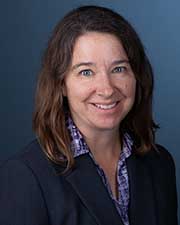KU Engineering Professor Wins NSF CAREER Award for Research Into Wetlands’ Water-Quality Benefits
An assistant professor of civil, environmental and architectural engineering at the University of Kansas who is studying the ability of wetlands to improve water quality by removing nitrate is winner of a five-year, $577,000 grant from the National Science Foundation.
 Amy Hansen is recipient of an NSF Early Career Development (CAREER) award for her work to understand the role of vegetation in nitrogen exchange and removal in riparian wetlands.
Amy Hansen is recipient of an NSF Early Career Development (CAREER) award for her work to understand the role of vegetation in nitrogen exchange and removal in riparian wetlands.
Hansen wants to clarify the conditions under which wetlands and floodplains can have a positive effect on water quality, especially when fast-moving rivers are sending nitrogen- and sediment-laden flows into the riparian acreages. The wetlands, filled with vegetation, allow such flows to slow significantly and even to pool, thus changing the chemistry of the local environment.
During periods of heavy rain, nitrogen from fertilizers runs from farm fields into streams and rivers. Such nitrate then can harm the local ecosystem and challenge the quality of water supplies.
Hansen’s previous research has shown that riparian wetlands can help improve water quality significantly. With the CAREER grant, she wants to document and specify the conditions under which such improvements are delivered, so that the information can help guide wetlands construction and management.
“This project responds to a scientific and societal need to generalize our understanding of the potential for riparian wetlands to mitigate impaired water quality under the expanding local, national and global footprint of agriculture,” Hansen said.
CAREER awards are considered among the NSF’s most prestigious. The awards are given annually to about 500 early-career faculty who have the potential to serve as academic role models in both research and education. NSF expects recipients’ activities to build a firm foundation for a lifetime of leadership in integrating education and research.
Hansen, who joined the KU faculty in 2018, plans for the research to extend into learning, both on campus and in the field. She plans to engage KU students in the work through experiential learning in classes such as CE 756: Wetland Hydrology, and to generate community engagement through collaboration with Baker Wetlands at the southern edge of Lawrence.
Her team will gather observational data, detailing how much and how fast water flows into wetlands, and how long it remains. Field experiments on wetland vegetation will measure the effect of water velocity and vegetation on rates of nitrogen transformation. Mathematical models then will be created to explain whether local-scale interactions can explain larger patterns in nitrogen removal.
The goal is to gain new information, change education and outreach and, ultimately, make a difference in water quality.
“My research has sparked a lot of interest from people who are invested in improving water quality and quantifying the ecosystem services that wetlands could provide,” Hansen said. “I hope that this new study transforms our understanding of how riparian wetlands can contribute to nitrate removal and informs new approaches that incorporate wetlands into water resource management and planning in agricultural landscapes.”